#mental health strategy
Text
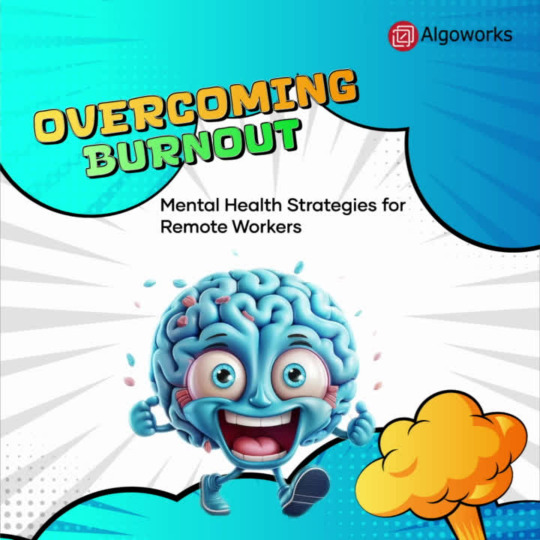
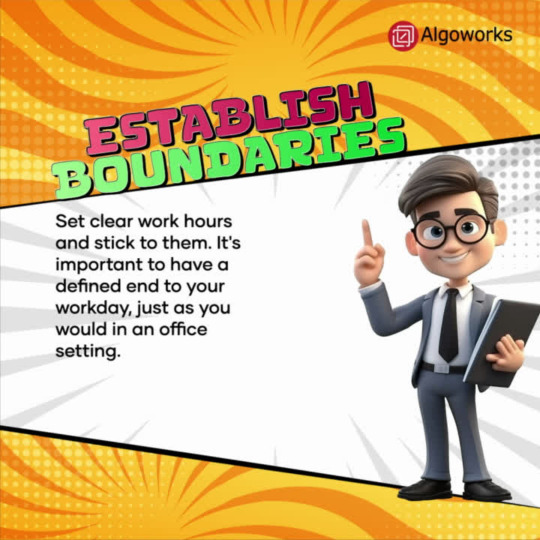
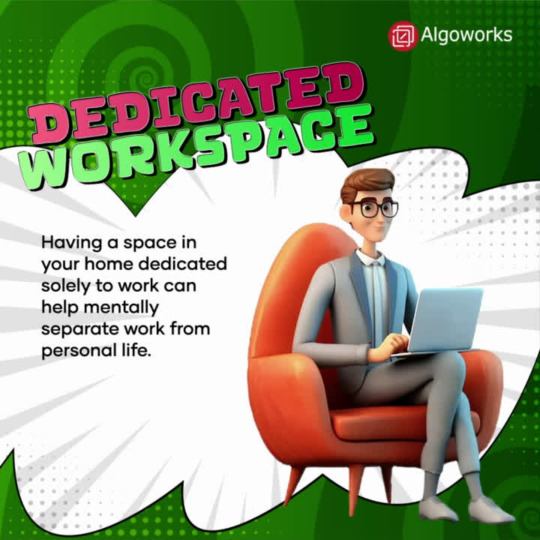
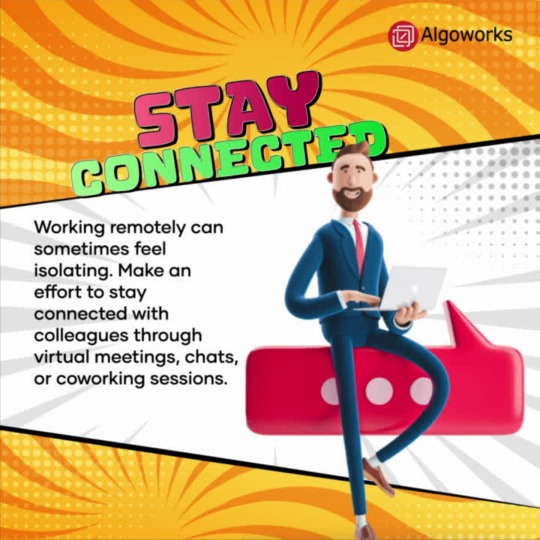
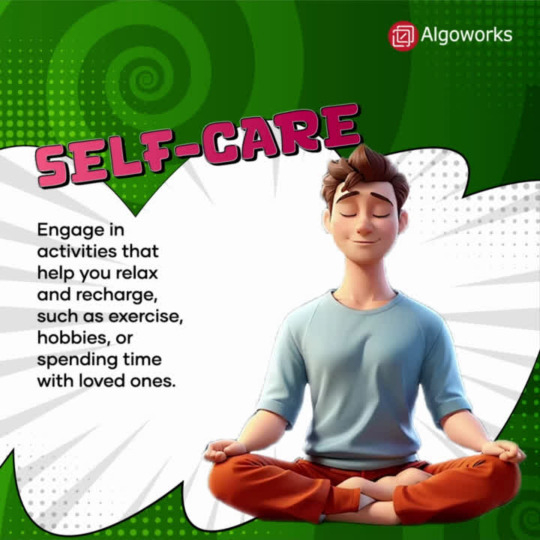
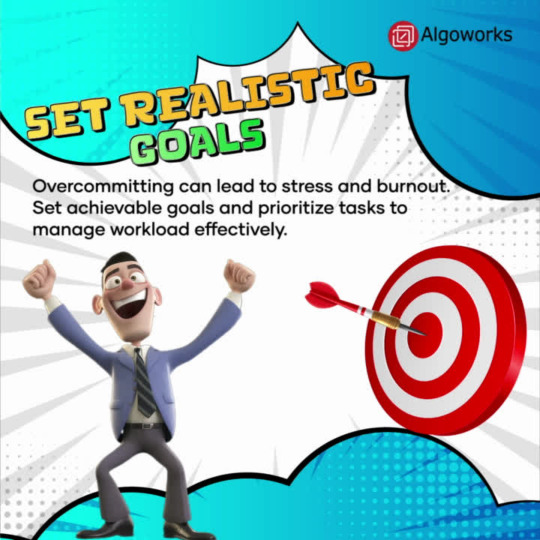
Remote work mental health strategy: Set your Slack status to 'Taking a mental stroll in the virtual park' when you need a break.
Just make sure not to accidentally send your boss a selfie of you pretending to feed virtual ducks.
1 note
·
View note
Text
A friend once told me that when they are struggling with getting laundry done, she pretends it is her sworn duty to smuggle the young prince out of the castle to safety, disguised in a laundry hamper.
Now, when I am struggling with hygiene, I pretend I am part of a village with an annual festival, and I get one day a year to spend luxuriously at a bathhouse in preparation.
What my friend imparted on me was the skill of turning mundane tasks into fantastical adventures to make them more compelling and bearable.
So next time you need to go on a mental health walk, maybe consider doing reconnaissance for a secret underground organisation.
Next time cooking is too much of a chore, consider you ability to turn space station rations into a feast to the delight of your crewmates.
31K notes
·
View notes
Text
Random funny mental health advice
okay so, upon having a conversation with a friend about coping mechanisms, we reached the "personify the mental illness" strat. (basically, where you talk back at the mean brain thoughts and go "nuh uh") and i've realised the funniest strat list:
gaslight, gatekeep, girlboss.
gaslight- "brain what? no? that's not true"
gatekeep- "okay sure but i raise you: no. you're not allowed to control me"
girlboss- "fuck you braaiiinnnnnnnn im gonna do it anywayssss you're a bitccchhhh"
(it genuinely kinda helps! try it!)
#mental health#coping#wholesome? maybe?#mental health strategy#coping mechanism#healthy coping#anxiety
1 note
·
View note
Text
World Mental Health Day 2022: Make mental health & well-being for all a global priority
World Mental Health Day 2022: Make mental health & well-being for all a global priority
Overview
World Mental Health Day is observed on 10 October every year. The overall objective of World Mental Health Day is to raise awareness of mental health issues around the world and mobilizing efforts in support of mental health.
World Mental Health Day provides an opportunity for all stakeholders working on mental health issues to talk about their work, and what more needs to be done to…
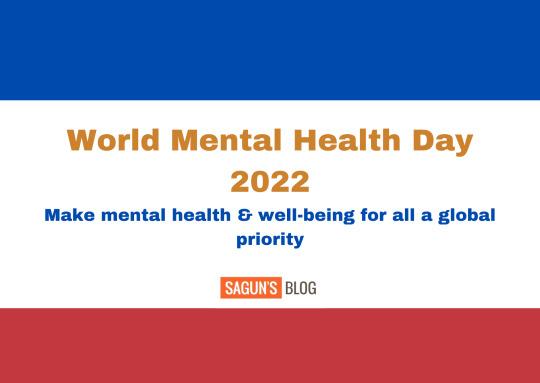
View On WordPress
#Mental Health#Mental health care for All#Mental Health Strategy#Public Health#Public Health Events#Public Health Important Day#Public Health News#World Mental Health Day
0 notes
Text
So... what exactly are executive functioning supports...?
Planners, checklists, and reminders are definitely executive function supports, but they aren't the only things that are available. ...so, I've made a list of some examples. A thread (🧵)
Executive functioning includes so much, so executive function supports can be SO MANY things. Executive functions include decision making, working memory, task initiation, planning, prioritizing, many forms of self-regulation, and more.
So let's talk in broad categories
Category 1: Decisionmaking
Avoiding a decision altogether,
Choosing randomly,
Reducing the number of options to decide between,
Always doing the same decision (such as having a uniform for yourself),
Outsourcing decisions,
Having outside structure/expectations
Category 2: Working memory
Keeping things visible,
Reminders,
Collaborators who gently remind you of things,
Writing it down (i.e., notebooks, post-its, to-do lists, etc.),
External structure such as lunch hours,
Understanding why and how working memory fails
Category 3: Information processing
Avoiding weak processing areas (eg. reading for dyslexics like me)
Have information in multiple forms,
Make information processing context relevant,
Reduce incoming information or competing demands
Category 4: Task Management
Body doubling,
Transition time,
To-do lists,
Breaking tasks down (including people to help with that),
External structure for identify the next step,
clear, explicit instructions,
Schedules, planners, itineraries.
Category 5: Organization
Mind maps,
Labels,
Notetaking templates,
Physical organizers,
Organizing methods (Kondo, Only 4 Things, etc.),
House cleaners, professional organizer, etc.
Clear bins,
An ability to toggle visibility
Category 6: Cognitive Flexibility
Transition time,
Pre-change warnings,
External support for identifying and reminding the new direction,
Context-based exemplars of similar change,
Visual schedules,
Reminders of when structure will start again
I've listed a lot of things here, but there are just so, so, so many more options.
Executive function supports can be ways that we think or approach situations (internal) or structures imposed on us by others (external). They can be physical tools that we can touch and interact with (tangible) or completely abstract ideas or approaches (intangible)
The big takeaways are that executive function supports can be any tool, structure, or communication that supports any of our executive functions.
Executive functioning struggles are core to the ADHD and autistic experiences (and secondary to other ND conditions). This means executive functioning takes a lot of energy for ADHD and/or autistic people, and the more support we have the more energy we can use for other things
So, yeah, planners, checklists, and reminders are definitely executive function supports, but so is a highschool bell schedule, hobby-related groups, professional services, and colleagues (consensually) harassing you to remember to send that email.
There are a lot of options!
#adhd#executive function#executive functioning#coping#coping strategies#autism#task initiation#decision paralysis#actually autistic#neurodivergent#mental health#executive dysfunction
2K notes
·
View notes
Text
if you are an American,
🙂 are you good?
it’s officially tax season crunch-time folks!
You know what that means: sweaty searches for your W2 and paralyzing fear over whether you owe or not! 🙂
Will it be a return for you this year or will you be looking for a third job to cover that amount due? 🙃
I’m right there with you friends.
Let my humble contribution below, bring you some laughs as you languish to help combat the Sunday Scaries. 🐀❤️
youtube
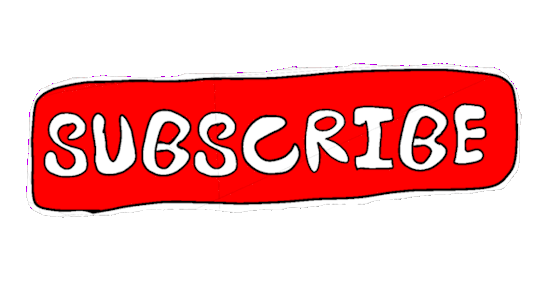
#taxes#tax services#taxation#tax preparation#tax planning#tax professional#tax policy#tax payers#tax payment#tax filing#tax forms#tax free#tax liability#tax evasion#tax season#tax savings#tax strategies#tax software#mental health#mental illness#mental heath awareness#mental health matters#Youtube
227 notes
·
View notes
Text
I try to generally be constructive and engaged with the show I love on here, so on this day, I’ll just say that one of the most thematically important aspects for me from the original ATLA is Aang’s emotional core of real shame for running away when he was hurt by the monk’s decision to send him away. People who feel the kind of deep-seated shame that Aang feels from this decision can understand how that kind of all-encompassing shame is not built around a simple failure or a lie they tell themselves; it’s constructed from real misbehaviors and transgressions of their own sense of ethics—lashing out, telling lies, attempting to hurt others intentionally—that then have consequences (abuses, abandonments, or deaths) which seem to far exceed their expectations or even basic logic.
The combination of the misbehavior with exaggerated existential punishments (along with a lack of support and amend-making in the immediate wake of the events) is what transforms a sense of guilt (I fucked up) into shame (I am a forever fuck-up). Then shame, that sense of being a secret monster ‘no matter what I do or how good everyone thinks I am,’ invites all the avoidance strategies (Aang puts on big smiles, makes lots of jokes, constantly tries to make everyone happy, hops from town to town without building deeper connections). One doesn’t want to acknowledge one’s true feelings or let others in to see those feelings and experiences because it’s too painful to face the grief at the same time that you have to look at yourself for being responsible—even when you recognize it wasn’t totally your fault. It’s just that if you had just been good, less emotional, less human, then maybe the world wouldn’t be so messed up. Of course, in a zen view of things, the world will always be messed up in the same way it will always be beautiful. These are constant facts that always coexist in balance, and this is the truth that Aang learns and that undergirds the whole series.
So I always loved that Aang ran away. It was his sin and his salvation. And it becomes this constant tension for the series—he gets hurt in Bato of the Water Tribe and starts to run away from Katara and Sokka, he runs away to the Guru in the Crossroads of Destiny and his best friend is attacked, he and the gaang retreat after the Day of the Black Sun failure, he runs away to meditation in Sozin’s Comet when everyone wants him preparing for war. Aang’s reluctance to be a hero and the attachments and petulance for which he gets criticized are what metamorphasize to become his most noble attributes. They allow him to empathize with others shame and, ultimately, wield the kind of compassion that can deconstruct the power and perfectionism of imperialism.
So yes, Aang ran away from his temple 100 years ago. It wasn’t the mentally healthy choice. It wasn’t the ethical choice. It wasn’t the wise choice. It was human and emotional and shameful and real. Aang is a better character for it. ATLA is a better show because of it. And we are better people when we understand these kind of tragic emotional experiences that people are trying so hard to grow through.
#aanglove#vague posting about the nf adaptation lol#I won’t go off in my posts but I will in my comments#only 17 minutes in tbh#and already amazed at realizing how cool it was that the of series wasn’t told in a linear style lol#I do think the casting department went off for the nf series tho#the kid playing aang is so perf#and all the actors fit their parts so well#but the show doesn’t understand or seem interested in depicting colonial violence at alllll#and the language of the fire nation wanting to ‘take over the world’ is so much more marvel than a colonial rhetoric#and then aang just wanting to ‘go get some air’ to clear his head…😑#we aren’t allowed to have problematic protagonists anymore I guess#only people with perfect mental health strategies allowed in young adult fiction#because we view fiction from a moralistic standpoint now instead of an empathetic one#but 🤷🏻♀️
328 notes
·
View notes
Text
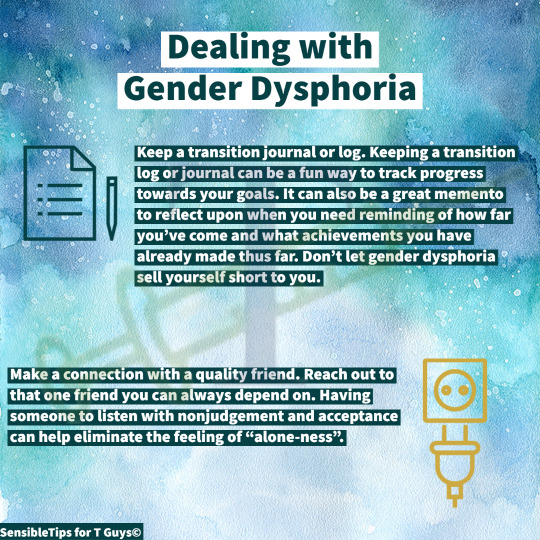
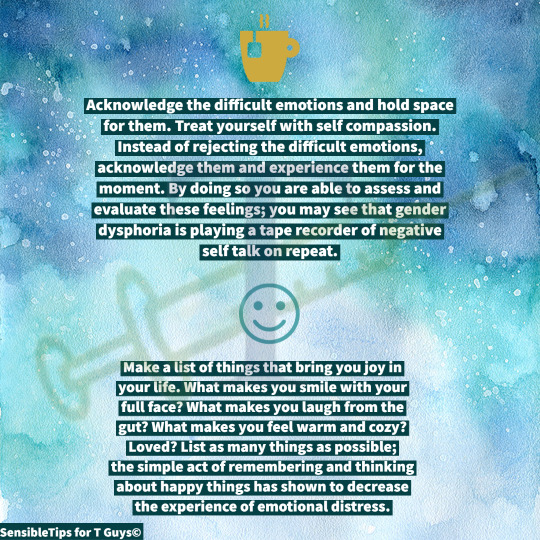
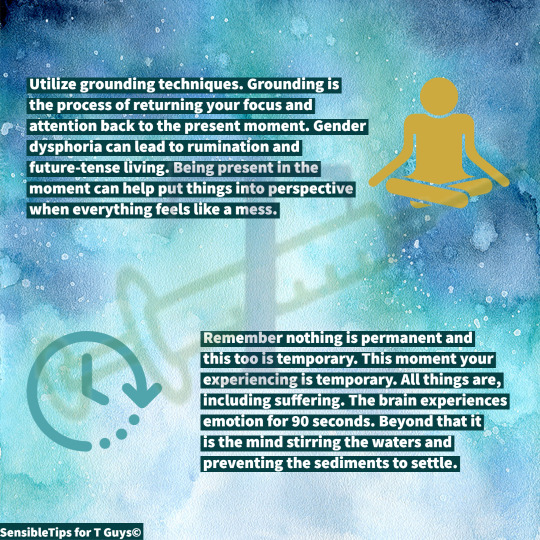
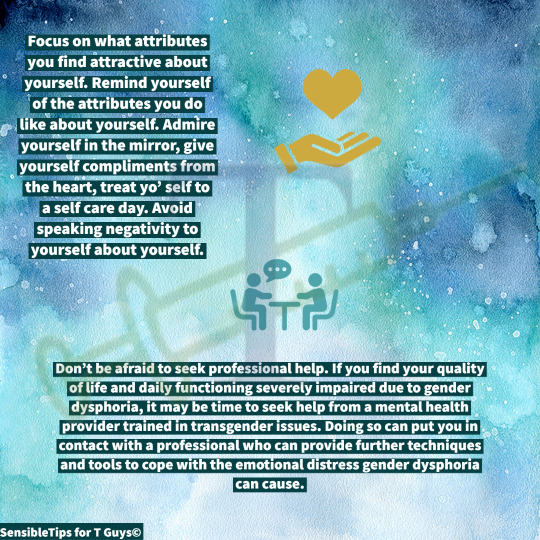
Mindful Monday
Tips for dealing with dysphoria when it reels its ugly head.
#FTM#F2M#transmasculine#transgender man#trans man#genderqueer#genderfluid#genderflux#demiboy#agender#bigender#non binary#pangender#FTM wellness#Mindful Monday#sensible-tips#healthy coping#coping skills#coping strategies#FTM health#FTM mental health
87 notes
·
View notes
Text
List of things to remember when u have a crush
1. Some girl has dumped him and never wants ANYTHING to do with him ever again
2. He’s probably talking to at least 2 other girls at the same time as you
3. His body count is probably uncomfortably high
4. There are other girls probably throwing themselves at him and he probably cannot resist temptation
5. He watches p*rn and is probably addicted
6. He’s most likely capable of looking you dead in the eye and lying for months on end. He will swear up and down on his mom, his dead grandma etc to get away with one pathetic lie
7. Lying about his height unnecessarily
8. Check his following on Instagram or TikTok. That is all
9. Probably has an ex that he fumbled and isn’t over her
10. He’s probably only talking to you because he wants to smash
11. Probably on a plethora of dating apps and is constantly searching for the next best thing
12. Probably listens to ‘alpha male’ podcasts and believes he’s the prize
#I’ll update this as I think about it but feel free to add more#this is about straight men but not limited lol#important reminders#self love#mine#it girl energy#it girl#dating#female dating strategy#relationships#crush#dream girl tips#dream girl#pink pilates girl#pink pilates princess#pinkcore#girlposting#girlblogger#hyper feminine#hyperfemininity#mental health#coquette#dollette#dark femininity#dark feminine energy#dark feminine aesthetic#feminine blog#divine feminine#sprinkle sprinkle#hypergamy
68 notes
·
View notes
Text
ten ways I cope with psychosis
Grounding techniques — Make use of the five senses: Listen to your favorite song. Run your hands under cold water. Taste your favorite snack. Smell your favorite candle. Look at beautiful artwork. Be mindful about the sensations you feel while engaging in these activities.
Listening to music — My go-to way to deal with auditory hallucinations. I recommend listening to instrumental music, if you are prone to ideas of reference.
Creating art — A good creative outlet takes the focus away from my psychosis and towards whatever it is I’m creating. Plus I can make something that symbolizes how I feel while psychotic.
Taking a walk — This can be hard to do if I’m psychotic, as the paranoia makes me think people outside are watching or following me. So what I like to do is pace the hallway in my house. It helps me keep my mind off things.
Journaling — Writing out what I’m feeling can be an immense relief, especially when I’m experiencing delusions. Also I can also look back at these thoughts and reflect on them.
Identifying triggers — Discovering what makes you psychotic can help to prevent future episodes. (Be mindful about who you share this info with as others could use it against you.)
Breathing exercises — When I’m psychotic my stress and anxiety levels ramp up. Just one minute of deep, steady breathing helps to keep those levels under control.
Spend time with pets — Pets don’t judge you for being psychotic. They’re perfect for snuggles, and running your hands through their fur reduces stress and anxiety, and makes for a good grounding exercise.
Asking for reality checks — Sometimes I have trouble telling what’s real and what’s not. When in doubt, asking a trusted person for a reality check can be very helpful in dispelling delusions or paranoia. If you’re alone, recording with your phone can help to verify if you’re hallucinating.
Finding a community online — One if the worst parts of psychosis is feeling like you’re completely alone in this. But you’re not. I found communities of psychotic people on Tumblr, Reddit, Youtube, and more. I find that being around people like me helps me feel less alone in my mental health journey.
#mental wellness#psychosis#schizoaffective#delusions#hallucinations#psychotic episode#actually psychotic#mental health#coping mechanisms#coping strategies#self care#mental wellbeing#coping methods#coping skills#long post
224 notes
·
View notes
Text
“do the hardest task first”
no. just… no.
hot take: this doesn’t work for people with adhd (in my experience/from what i’ve heard from other people with adhd in my life). i recommend doing the easy/moderately difficult stuff first, that way you can convince yourself that it’s all going to be this easy and undemanding. then hyper-focus will kick in because your brain is like, “yeah, we can do this, we’ve got this.” then, before you know it, you’ve completed both the easy tasks and the hard tasks while hyperfocusing.
like, on a serious note, it’s always been easier for me to convince myself to get the most difficult tasks done when i’m already working/in the working frame of mind, not when i’m laying in bed or sitting on the couch, mindlessly scrolling through stuff on my phone, and struggling to start at all.
if the choice comes down to you not starting at all or starting with the easiest task first (which, for me, it often does), always, always pick starting with the easiest task first. sometimes you need a small victory, a little bit of an accomplishment, to give you the courage to take on bigger challenges.
#adhd#audhd#in my experience… ‘study tips’ or ‘time management tips’ from neurotypical people will almost never work for us#they don’t conceptualize time the same way we do#they don’t look at challenges the same way we do#it’s okay to take bits and pieces of their advice#ya know… whatever parts of it work for you#but don’t think that you have to use all the strategies and programs that they do to be successful#because you don’t#all that fake business soft skills/mental health guru/grind mindset stuff is total bullshit#pick strategies that speak to/work for you#it’s okay to fail at things and to have to try again#it’s okay to make mistakes and not get shit done sometimes#sometimes you need a fucking break#it’s okay to start with the easy stuff first and just ease your way into being productive#it’s okay to hyperfocus and work for hours on end sometimes#if it’s hard for you to take breaks when you’re studying and you feel like you learn better if you stay in that hyperfocused zone#than just go until the hyperfocus wears off#then take a break… eat… nourish your body… take care of yourself… and come back later#maybe later is later on that day#maybe later is tomorrow#either way is completely fine#do what works best for you#work with your neurodivergent brain… no against it#pol’s diary <3
86 notes
·
View notes
Text
Felt sad yesterday and decided to be constructive about it by making the most horrendous self love powerpoint I could possibly think of... we're talking comic sans, word art, rainbow letters, tHiS kInD oF tExT, horrific slide transitions that are excruciatingly slow and finally terrible terrible memes. It's the best idea I've ever had in my life.
52 notes
·
View notes
Text
oops! i did it again. lessons from this school year...


Hey, you remember that post I made about my winter term priorities? HAHAHAHAHahaha ha ha. That plan totally went to shit, but it's all part of the journey, right? 😅 (Tbh, it's quite difficult to make a conscious effort to change yourself when the default response to being and feeling busy is to go on autopilot -> all the unconscious habits, even if unhealthy, take control, and bc it's unconscious, you don't realize it until it gets quite bad! anyway! no more! my future plans make it so this will be impossible to do while still retaining some sense of sanity. so to prep, we're gonna slowly implement little changes so hopefully it's not so overwhelming that i give up)
🧘🏻♀️ comparing mindsets in fall and winter term
Fall term was not that bad bc I had 2 STEM subjects I really really loved and was interested in (biochem and mol bio 💕), and despite their difficulty, that love and interest and the feeling that "I am in the right field for me" kept me positive. There were times I thought I would feel burnout symptoms if I wasn't careful, but I really think that positivity protected me from the worst of it.
Winter term, however...I had one favorite subject: moral philosophy, which led to me wistfully dreaming about an AU in which I double majored in philosophy and piano performance, lol. After the highs of biochem and mol bio and the natural ease with which the bits of info flowed together in those subjects, I did not enjoy pharmacology or the 2nd half of psyc as much -> loss of interest -> negativity and feeling like I'm in the wrong field bc how dare I not like pharmacology (or psychology) as much as the other life science-y subjects when it's really so important for us to survive and thrive! 😅 I mean, there were times I could get that spark from pharmacology or psyc, but it wasn't often enough or intense enough to keep me consistently inspired throughout the semester. The feeling of "maybe I don't have what it takes and I'm in the wrong field" was compounded by the re-realization that there's sm to know of bioinformatics and I struggle to know any of it! Persevering is important, but it's harder to persevere with a negative mindset.
😤 what went wrong this school year and what i learned from it
I still struggle with perfectionism (and bc of it, procrastination). While it might not be as bad as it was in high school, I still spent too long on assignments that weren't worth much and during finals season, was so scared of getting less than 90% just to keep up my A+ streak. Like, I'm pretty sure no one who cares to know your GPA cares about whether you have an A+ streak or not. I have too high a threshold for what is a "disappointing" grade. I also struggle with deep regret about how I haven't mastered everything they throw at us in each course... definitely an unrealistic expectation, especially as the proportion of new info to absorb increases with each course. I did what I could using what I knew to do, so it is what it is. I may find ways to make improvements and learn more, but I won't beat myself up for not having known to do those things in the past.
Did not use effective study methods. Since first year, my problem has been keeping up with the readings and my solution has been to just use typed outline notes. It worked for the first few years when it was mostly review from previous courses with a few new concepts in between. But as I progress through my degree, the proportion of completely new info is increasing. This notetaking method won't work anymore bc it just causes cognitive overload, especially during exam season (when I've mostly forgotten the details of everything that isn't smth I've already known for years). E.g. for pharmacology, I got so bogged down by the details of all the drug classes that I didn't see the big picture and so didn't organize the info according to it. This made it hard to see patterns and better chunk the info. I was so stressed during finals season bc of this (and the sheer amount of notes that I had to read for psyc 😭). What makes it feel like even more of a problem is that the cognitive overload problem from my notetaking method has been a thing for all other uni courses thus far, it's just that pharmacology was the first time I needed to create a stronger connecting thread between the otherwise disparate pieces of info (drug classes). In all other courses, that thread was part of the nature of the topic being studied so I eventually understood it as I kept going and mentally re-organized it in my brain...but even then it was hodge-podge and so my depth of mastery was and is so flimsy, and every semester I leave feeling drained and like I wasted the opportunity to maximize my learning. (How dramatic I get about this is also probably tied to my perfectionism, but I still think it would greatly benefit future me to change my notetaking style.)
🎓 advice for future me
Look at the academic calendar, specifically the faculty course descriptions. Look at how many hours they say you should expect to spend on each activity in the course. Try to use those learning hours as a guide for your schedule so that you don't spend too long on an item that isn't worth much. If there isn't such a breakdown, assume one based on whatever they give you or other courses and adjust from there.
Be a more efficient reader by skimming the text first so you can map the flow of info in a way that best creates ease of understanding/synthesis/memory (e.g. via an outline, tree diagram, flowchart, mind map, or simple drawings - and noticing when a list/outline will NOT be helpful bc it'll just be too overwhelming and not easy to compare/contrast info and see patterns). I knowww you've survived thus far without doing it this way and done well, BUT with this many courses, the increasing complexity of each subject, and the overload of info in each, you WILL need to do this to make quicker work of the readings, save you sooo much stress during exam seasons, and improve how much you learn while in school which is the real goal you've wanted to achieve all this time. Don't repeat the mistake you made in pharmacology. And it really doesn't have to be aesthetic and you definitely should NOT get caught up with it if you really wanna learn. You could just use one color for everything and a highlighter and just basic shapes/lines - that alone can be way more effective than boring paragraphs/lists or a colorful, overly complex diagram that'll just distract you from the main point.
Create a realistic daily routine (wake-up and sleep times, start and end times for schoolwork) and be strict about following it. Set your non-negotiables for personal goals to keep up with alongside your schoolwork bc academics aren't everything. Remember how you regretted not devoting more time to extra-curriculars and other skills in high school which would've rounded you out as a person. You can try theming the parts of the day so that you don't have to think about what task you should do first after study breaks and keep up the momentum (e.g. mornings for readings and notes, afternoons for active recall/homework). Then you can live the rest of the day after school as structured or unstructured as you wish. If this strategy doesn't work for you, you don't have to use it.
Take advantage of interleaving so you don't get bored. Whether by following the theming strategy or just switching subjects every hour, idc if you aren't done yet, you better switch bc the second consecutive hour of the same thing is never as effective as the first.
#studyblr#studyspo#study motivation#becoming that girl#pink aesthetic#study tips#study advice#personal post#100dop#100 days of productivity#stemblr#stem academia#stem student#100 days of studying#100 days of self discipline#perfectionism#study strategies#mental health#chaotic academia
20 notes
·
View notes
Text
Mental Health Resources
Coping skills
For uncomfortable emotions
Checklist (99 activities)
100 activities
Alternatives to self-harm
What are healthy coping skills?
Feelings
Feeling words
How to talk about feelings
Interactive map of emotions
Worksheets
50 worksheets
28 mental health games, activities & worksheets
Free mental health worksheets
97 notes
·
View notes
Text
Hey, fellow spoonies! Got a min for a bit of writing that has absolutely transformed my relationship to my chronic illness?
This is from Mindfulness Meditation for Pain Relief by Jon Kabat-Zinn, based on his experiences co-running (?) a clinic specifically for people with severe unmanageable chronic illness & chronic pain. Part of the book is exercises, which weren't hugely impactful for me. But this section I've listened to over and over. It's been a game changer for me. Maybe it'll help you too.
Below the cut bc it's long.
"First, a working definition of mindfulness so we know what we're talking about when we use that word. You can think of mindfulness as pure awareness. In particular, the awareness that arises from paying attention, on purpose, in the present moment, without judgment or reaction, to whatever appears in the field of your experience.
You already have awareness. It’s as much a part of being human as our capacity for thinking or for breathing. So you can always ask yourself in any moment: is my awareness of pain, in pain? and then take a look and see. You can also expand this line of investigation to ask yourself, is my awareness of fear afraid? Is my awareness of anger, angry? Is my awareness of sadness, sad? Very revealing and liberating exploration, as we shall experience firsthand.
Of course being non-judgmental and non-reactive sounds like an ideal. But it isn't, really, not in the way we’re talking about it. It's a way of being in relationship to experience, a commitment to--as best we can–suspend our judging for a time, and suspend believing in our judgements as being true.
Of course, we judge everything, and tend to react automatically whenever things are not to our liking. And we can be very emotionally reactive, especially when we're hurting. So as we shall see further on, and in the practices themselves, we just observe the judging and reacting when they arise, and–as best we can–refrain from judging our judging, or reacting to our reactions.
A number of principles, attitudes, and perspectives are important to keep in mind when cultivating a mindful approach to working with chronic pain conditions or any other distressing elements in your life.
Here are seven that are fundamental and bear revisiting and keeping in mind, and listening to again and again, just as with the meditation practices. We will be making use of them every day, and even moment by moment throughout the day.
1. As we said, as long as you’re breathing there is really more right with you than wrong, no matter what is wrong. And our work will involve mobilizing those interior resources of your own inner landscape, of your body and mind, to work for you to improve the quality of your day-to-day and moment-to-moment life.
2. One of those interior resources is the power of the present moment. The power of “now” is enormous, yet mostly we persist in living in the past or in the future, in memory or in constant anticipation, worry, and planning, most of the time. And we never realize and never recognize how powerful and healing it can be to inhabit this moment, the only one we are ever alive in.
So strange as it may sound, it turns out it is very challenging to actually live in the present moment, even though it's the only time we ever really have to do anything: for learning, for growing, for coming to terms with things as they are, for expressing our affection and appreciation for others, for loving. All this takes ongoing practice.
3. Of course we are happy to show up more in the present moment as long as it's exactly to our liking. But it usually isn't anywhere near as good or as pleasant as we would wish it to be. That is true even if we don't have a chronic pain condition that we could see as the cause of all our troubles.
Have you noticed how easy it is to always want things to be different from how they actually are?
We certainly don't want to inhabit the present moment if we don't like it, and we certainly don't like it if we are in significant pain. So we can easily get caught up in trying to distract ourselves and escape from the present moment because it's not to our liking.
4. Our usual options when faced with situations we don't like and wouldn't want anyone to suffer from, are twofold. As we just saw, we can turn away from them and try to ignore them or escape from them as best we can. Or alternatively, we can get caught up in obsessing about our troubles endlessly and feel victimized.
Either way we might (as so many people do) turn to familiar resources at our disposal to dull the pain, such as alcohol or drugs, or food or TV, even if those coping strategies don't work, are addictive, or have terrible consequences that may make our lives worse in the long run.
We might also get into the habit of being irritable, gruff, and angry a good deal of the time, out of our own pain and frustration. Or emotionally withdrawn from others and from life, distant, cut off, in a state of perpetual contraction of both body and mind.
None of these coping strategies make for much happiness and ease of being. Grinning and bearing it isn't much fun. And blaming all our troubles on the pain doesn't actually make anything any better, as we usually come to see at some point or other. This can just further compound our frustration and even despair.
5. There is a third way of dealing with painful experiences, a way of being rather than perpetual doing and forcing. One that involves neither turning away from painful experiences, nor becoming overwhelmed by them. That third way is the way of mindfulness, the way of opening to and befriending our experience, however strange that may sound.
We do this by turning toward what we most fear to feel and opening gradually, over time, and only to the degree that you choose, to the full range of our experiences in any given moment, even when what we are experiencing is highly unpleasant, aversive, and unwanted.
You could think of it as putting out the welcome mat for what is happening. Because whatever it is, it is happening already. Any attempt to turn away is really a denying of your situation, which doesn't help much. And succumbing to resignation, a sense of being defeated, or to depression or perhaps even self-pity will clearly only make matters worse. If we take the turning-away route, we will be turning away from the opportunity to learn from what the pain has to teach us.
If we take the turning-away route, even though it may seem simpler when we are in a depressed mind-state, we may never find openings, new possibilities, new beginnings, new ways of being that are available to us right inside our own circumstances and our own mind and body. We might not discover that we can become stronger and more flexible in the face of whatever it is that we are dealing with, discover new options for relating to what we are carrying – which is the root meaning in Latin of the word “to suffer.” The approach of mindfulness, of turning-toward and opening to our experience – even when it is difficult – can readily lead to new ways of seeing including new possibilities for coming to terms with our situation in the moment, whether we like it or not, whether we want it or not.
This is called resilience, an interior strength we can cultivate through practice. A way to live, and live well, with what life offers up for us: “the full catastrophe,” as Zorba the Greek called it – the human condition itself.
6. This path of mindfulness involves learning to open to experience moment by moment with kindness and compassion towards oneself, whether what you are experiencing in any given moment is pleasant, unpleasant, or neither pleasant nor unpleasant. And without judging the experience as good if we like it, bad if we don't like it, and boring if we don't have any particular feeling one way or another.
As we said earlier, that doesn’t mean we won’t be judging plenty. But we can form the intention to suspend our hair-trigger tendency to judge everything according to whether we like it or not, and also our tendency to react emotionally and fairly automatically in a similar way : with acquisitiveness, even greediness, if we like it and therefore always want it to last or want more of it; and with rejection, anger, hatred, or disappointment if we don’t like it and want it to go away.
So non-judging and emotional balance in the face of challenging circumstances will be factors we can cultivate in working mindfully with our moment-to-moment experience–not as ideals we try to impose on ourselves or strive to grab hold of, but as potentials already within ourselves that we can learn to recognize and bring into greater awareness when they do arise.
Over time and with practice, we may find that being less emotionally reactive and less harshly judgemental, and kinder and more accepting of ourselves and our moments–however they may be–becomes more and more our default setting, rather than anger, resentment, fear, self-loathing, and contraction in both the mind and the body. And since these kinds of contractions of mind and body usually increase the intensity of our pain, they just compound our misery and suffering. This is one easy way we can exert significant positive influence over our pain.
7. None of this has to do with making anything go away. We’re not trying to suppress our pain or “control” it, or suppress our emotional state. We’re not trying to fix anything at all–even though we may want to, or feel helpless and resentful that medicine cannot fix what we feel is the matter. On the contrary, we are just looking for a place to sit or to stand, a momentary refuge within which we can contemplate the present moment, and perhaps discover some respite right in the middle of things as they are, however they are. Amazingly, this stance of what I often call non-doing or just being can very quickly lead to things changing–since things are always changing, even our pain and our relationship to it.
But sometimes if we are too stuck in our thought-habits, in the same old ruts regarding our condition, desperate to get somewhere else or fix something you think might be broken, or else make it go away, our very desire and fixation may lead to its just staying around longer, as if we were actually feeding those energies, as if we ourselves are locking ourselves in and preventing our world from changing. The world and our bodies are always changing. That is a natural law: the law of impermanence. Everything changes. Why would we be an exception? So sometimes patience and forbearance may be called for, and good strategies for allowing things to change and even heal on their own."
#jon kabat zinn#spoonie#mindfulness#coping strategies#chronic illness#chronic pain#pain management#mental health#I just have the audiobook so I've made my best guess at kabat zinn's punctuation#I'm not affiliated with him or anything I just found his work super helpful and want to share#if it seems helpful to you you might consider checking it out from your library to hear/read more and to help him out as a writer#this is not mine!#in case that's not obvious
21 notes
·
View notes
Text
thoughts on support and the meaning of coping.
if hotlines don’t have a text service, i can’t access them. if support groups and drop-in centres ask you to email and introduce yourself first, i get anxious.
just because support is available, doesn’t mean it is accessible.
then again, sometimes when you’ve been in an area or institution with no support services, you just assume that, when you move elsewhere, there won’t be any available. don’t assume that; always look for help.
“support is available” and “i’m here if you need to talk” are Not empty phrases made to comfort you; they are true.
if you’re like me, you may get the feeling of “it’s not bad enough; i’m not actually struggling; i can’t articulate it so there must be nothing wrong; making a big deal out of nothing” kind of panicked thoughts right before accessing support. don’t listen! you deserve help, there is no ‘bad enough’. if it hurts you, then you deserve help because you don’t deserve to be in pain.
long post ⚠️
recently someone supporting me told me that i should seek help for a specific problem i have with studying in classroom settings (im a uni student), related to my social anxiety. i never had support in school, so it shocked me because classroom settings are everything and just the accepted organisational status quo in schools; they are seen as the brick and mortar of ‘teaching and learning’. i knew there was more freedom and flexibility in university, and that ‘support is available’. but i had always thought of ‘support’ in an individualised, neoliberal, medical-model way (ie. “we’re gonna fix you to fit with the system, and, if we can’t do that, we’ll just support you through crises as you’re tormented by something not made for you”). but actually the way this person phrased it was in terms of ‘Fairness’ and a ‘Level playing field’. they said “it’s not right for you to be feeling anxious and frozen in those learning spaces because it harms your studies, when everyone else is feeling comfortable and able to learn better”. i always considered it with the gaze of internalised ableism (ie “this is my problem; this is my flaw; i’m too sensitive is why i’m anxious”) and i focused so much on treatments for my anxiety as a prerequisite for fixing the problem of falling behind others in academia. but actually i needed support not only to get better, but to get accommodations in the meantime.
coping isn’t settling for an environment that bulldozes through your illness, ignoring it and (intentionally or unintentionally) triggering you. coping is not an individualised repression of symptoms until you burn out. coping is the act of doing things while having an illness that you could not do without support. bad definition but im tired. 🌹🌹
#madpunk#neuropunk#actually mentally ill#social anxiety disorder#coping strategies#mental health support#coping mechanisms#academic support#tw for mentions of therapy in tags ⚠️⚠️⚠️#might be getting therapy again. nervous because it was bad last time
46 notes
·
View notes